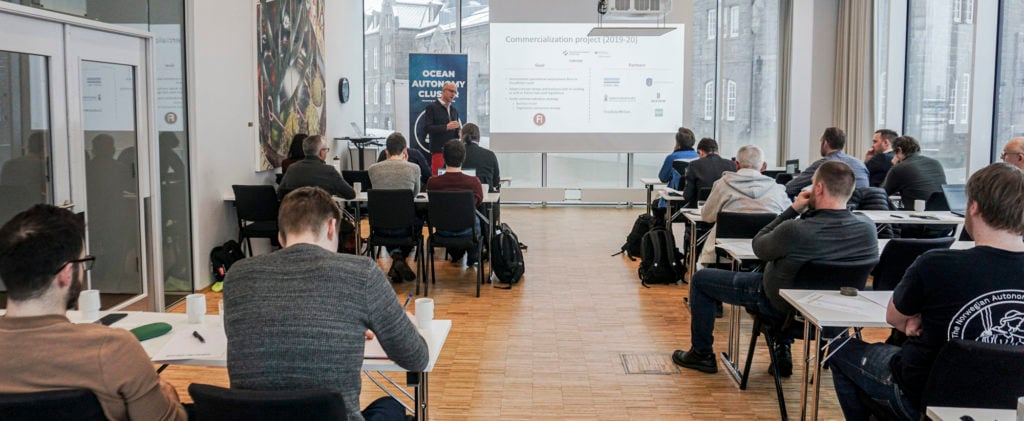Welcome to our newest member Boreal!
The Ocean Autonomy Cluster keeps growing, and we warmly welcome the leading nationwide public...
35 participants were gathered to learn more about autonomous ferries during the Ocean Autonomy Cluster’s seminar ‘Innsikt #Autonome ferger’, the first in a series of insight seminars on various topics.

The participants and speakers all agreed that there are many opportunities to look at when it comes to autonomous ferries, and that the Ocean Autonomy Cluster has an important role in how to work forward on the subject.
Norwegian University of Science and Technology (NTNU)
NTNU has developed a prototype for autonomous/self-steering passenger ferries for use in cities with canals and other waterways. The autonomous research vessel milliAmpére is now being tested in Trondheim. The aim of the project is to develop groundbreaking new concepts and methods which will enable the development of autonomous passenger ferries for transport of people in urban water channels.
– ‘Autonomous ferries’ is a topic that we can further explore together. Cooperation will help us to better exploit market opportunities. Norway already has a great opportunity with our technological advantage, and the cluster can be a perfect ‘way in’ for us , said Jan Onarheim, Innovation Manager of Autonomous Systems at NTNU’s Department of Engineering Cybernetics.
Zeabuz
Erik Dyrkoren, CEO of the company Zeabuz, held a presentation of their autonomous waterbus concept. Zeabuz is a spin-off from NTNU and aims to revitalize urban waterways in smart cities through autonomous electric passenger ferries. The Zeabuz concept is based on emission free ferries operating on-demand 24/7. The company is looking to build a new global venture together with key stakeholders in the maritime and digital industry, and Dyrkoren is optimistic about what the industry can achieve together.
– It’s going to be fun! The cluster has gathered a lot of enthusiastic and interested people who actually knows what they are doing. Naturally, it will be hard and demanding to succeed in this market, but also very exciting.
Maritime Robotics
Vegard Hovstein, CEO of Maritime Robotics, presented the ongoing project of developing the world’s first autonomous and commercial city ferry by 2022 in the city of Kristiansund (Sundbåten). Maritime Robotics is leading a consortium of eight partners who will use today’s Sundbåt, ‘MS Angvik’, as a platform for testing to develop an autonomous Sundbåt. ‘MS Angvik’ is a 15.6 meter long passenger ferry built in 2004, with space for 70 passengers.
– We’ll be learning as we go. Trondheim’s ‘moon landing’ is possible, but we need to have a step-by-step approach to opportunities that arise from new technologies and regulations. The ocean is the limit!, said Hovstein.
SINTEF
Senior Researcher at SINTEF Ocean, Ørnulf Jan Rødseth, held a presentation on effective and environmentally friendly car ferry alternatives. SINTEF is an internationally recognized research institute on a wide range of topics within autonomy. In addition to several ongoing projects, SINTEF is responsible for the operation of NFAS (Norwegian Forum for Autonomous Ships) and INAS (International Network for Autonomous Ships). SINTEF is also an important actor in international standardization, and has extensive international cooperation on the development of autonomous vessels.
– Trondheim is now the global hub for developing this type of technology. A great test site in Trondheim also demonstrates the well-established cooperation between the businesses in the region. We have a unique environment here in Trondheim, with huge possibilities for developing autonomous technology, sais Rødseth.
Norway’s Renewable Energy Cluster
Project Manager Thomas Bjørdal at the Renewable Energy Cluster (Fornybarklyngen) shared his perspectives on energy supply for autonomous ferries. He believes that Norway has a unique position and a solid advantage in developing green and sustainable transport solutions. Clean and sustainable maritime transport is a key to reach national and international emission targets. Several ongoing projects on zero-emisson ferries are planning to use batteries and/or hydrogen to take a giant step in a more environmentally friendly direction on behalf of the maritime environment in Norway.
Cluster Manager of the Ocean Autonomy Cluster, Frode Halvorsen, is greatly inspired by the enthusiasm from the members of the Ocean Autonomy Cluster.
– This confirms the importance of such topics, and verifies the knowledge and business potential within the industry, said Halvorsen.
A big thanks to everyone who showed up and shared their thoughts and experiences on the topic of autonomous ferries. Be sure to check www.oceanautonomy.no and subscribe to our newsletter for upcoming events and seminars.
The Ocean Autonomy Cluster keeps growing, and we warmly welcome the leading nationwide public...
The city of Kristiansund may be the first city in the world to have an autonomous passenger ferry.